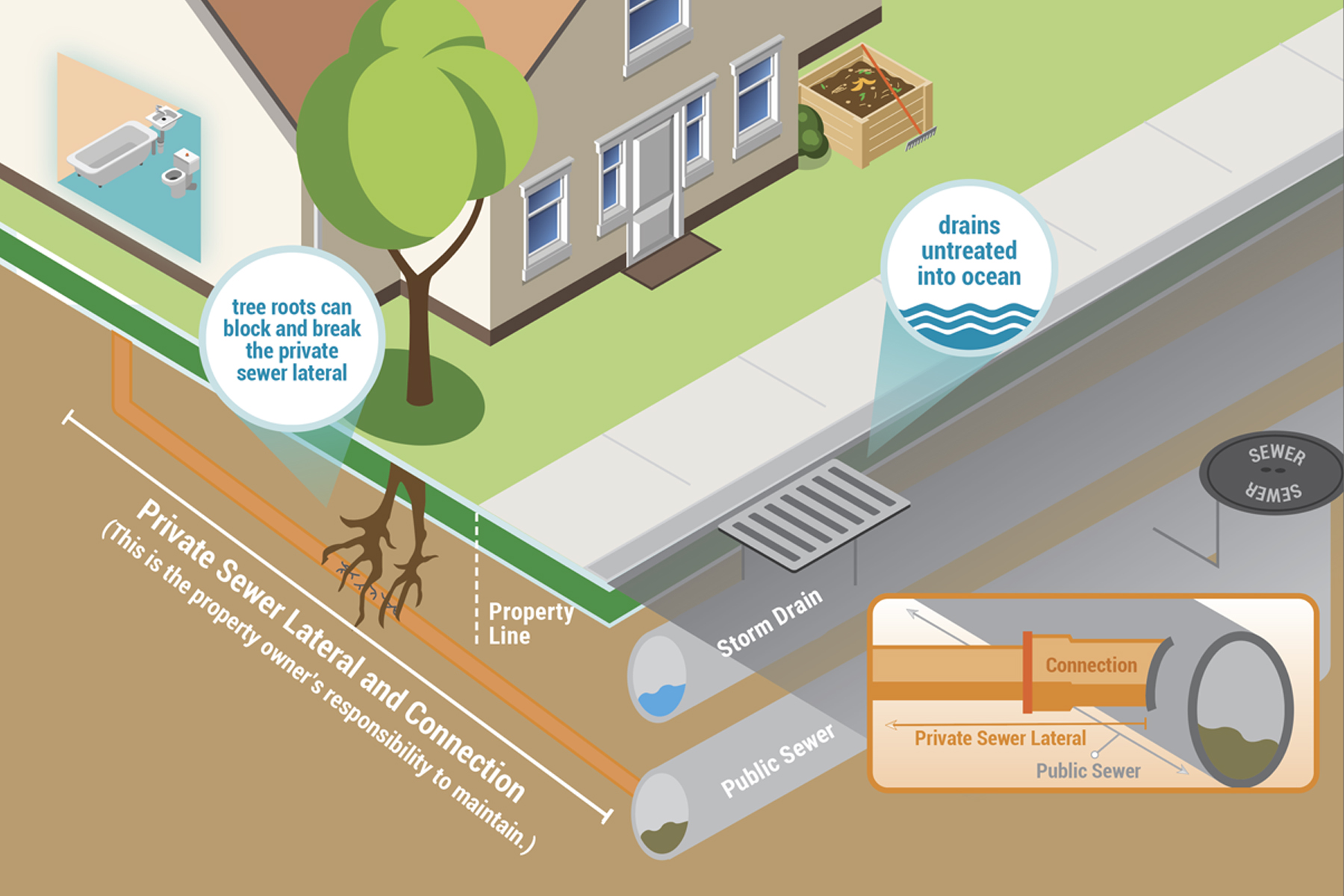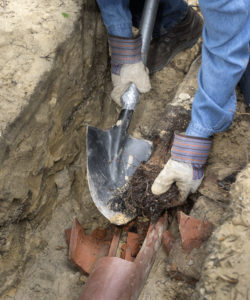GUIDE TO PREVENTING COSTLY SEWAGE SPILLS
December 21, 2022

All properties with sewer service have a private sewer lateral. Sewer laterals transport your property’s wastewater from toilets, sinks, and showers to the public sewer line. Unlike the storm drain system, water in sanitary sewers passes through a wastewater treatment plant before flowing into our waterways. In Orange County, the sanitary sewer and storm drain systems are separate because they transport different kinds of water. Sewage spills are problematic because they can introduce wastewater to the storm drain system and eventually our creeks, rivers, and ocean. Raw sewage contains high levels of bacteria from human waste that can harm surfers, swimmers, and aquatic life if released into the environment, so it’s critical to prevent spills and have them cleaned up immediately if they occur. It’s often overlooked, but property owners are responsible for maintaining their private sewer lateral to prevent spills and are liable for any spills that occur on their property or from their lateral line.
In this article, you will learn tips for preventing blockages, maintaining your lateral, identifying signs of a spill or backup, and actions to take when a sewage spill occurs. Let’s get started!
Preventing Blockages
Composting recycles organic waste into a valuable fertilizer that can enrich soil and plants. It’s created by The first step to preventing sewage spills and keeping our water bodies healthy is preventing blockages. Blockages can come from flushing anything other than toilet paper down the toilet, improperly dumping fats, oils, and grease (FOGs) down the drain, and tree roots growing into cracked or broken sewer laterals. When blockages occur, they can cause backups or burst pipes which are smelly and costly to repair.
Preventing blockages in the bathroom:
- Only toilet paper should be flushed down the toilet.
- Other sanitary products like ‘flushable’ wipes, facial tissue, baby wipes, and diapers must be disposed of in the trash. These products actually cause blockages if they are flushed down the toilet because they don’t break down like toilet paper.
Preventing blockages in the kitchen:
- Scrape food scraps into a food waste/organics receptacle before rinsing dishes and utensils in the sink.
- Have a mesh strainer in your sink if necessary to catch any remaining food scraps.
- Once you’re finished cooking, let the grease cool then pour or scrape it into a metal can. When the can is full, dispose of the grease properly.
Preventing blockages in your yard:
- When updating your landscaping, consider tree or shrub species that do not grow excessive roots.
- Know where your lateral is and plant trees or shrubs several feet away.
Keeping your private sewer lateral clear is important to preventing blockages, backups, and spills as these can lead to expensive cleanup and repairs. It also helps protect our waterways!
 Removing excessive plant roots from a broken lateral.
Removing excessive plant roots from a broken lateral.
Maintaining Your Lateral
The second step to preventing spills is to maintain your private lateral. Without proper maintenance, your lateral can get damaged, accumulate debris, and break.
To properly maintain your lateral:
- Hire a licensed plumber to evaluate your lateral and determine a maintenance schedule for your property.
- Periodically have your lateral cleaned of grease, debris, and roots by a licensed plumber.
- Repair or replace worn-out or damaged laterals as soon as possible.
Staying on top of your lateral maintenance can help prevent expensive sewage emergencies and protect water quality.
Signs of a Sewage Spill or Backup
Do you know the warning signs for a sewage spill or backup? Here are some of the key things to watch for:
Signs in your home:
- Water is draining slower than usual and getting slower as time passes.
- The drains or toilets in your home are backing up.
Signs in your yard:
- Unusually wet or soggy areas that might smell of sewage.
- Manhole covers, outdoor drains, and sewer cleanouts are leaking.
Recognizing these signs early can prevent a spill which can back up into your home or contaminate our waterways.
Keeping your private sewer lateral clear is important to preventing blockages, backups, and spills as these can lead to expensive cleanup and repairs. It also helps protect our waterways!
 Largle-scale sewage spill.
Largle-scale sewage spill.
What to Do When a Sewage Spill Occurs
Take swift action. When a sewage spill occurs, follow these steps to prevent and reduce damage to our creeks, rivers, ocean, and your property!
Things to do in your home:
- Shut off your property’s water and stop all water usage.
- Contact the proper sewer agency for sewer spills from a cleanout or manhole. Unsure of who your sewer agency is? Enter your address here and find out!
- You can also report any sewage spills to the 24-Hour Pollution Reporting Hotline at 1-877-89-SPILL (1-877-897-7455) or submit a myOCeservices request online here.
- Hire a licensed plumber to fix a possible sewer backup or spill on your property.
Things to do in your yard:
- Ensure people and pets stay away from the spillage area.
- Place sandbags and other absorbent material in the spill’s path to prevent this waste from flowing into the storm drain.
YOU are a vital part of protecting our waterways. By following the tips in this guide, you can prevent sewage from flowing into our waterways and harming our environment. Thank you for maintaining your property and protecting Orange County’s creeks, rivers, and ocean!
Our next door neighbor has a ficus hedge, taller than legal w/large trunks right against our 1968 property line. It constantly fills our sewer line. We clear the line annually. We have no other roots involved. Is the neighbor at all responsible? Thanks.
H2OC Stormwater Program Post author
Hello, D. Epley. We recommend contacting your local sewer agency for more information. Visit https://ocpw.maps.arcgis.com/apps/instant/lookup/index.html?appid=ab3681fb28df4ef3bfe92e9130db5ec7&disable_scroll=true¢er=-117.8581;33.661&level=10, enter in your address, and it’ll provide you with their contact information. We hope you have a great day!
A neighbor two doors up from us poured paint into the street and it spread down toward the sewer toward us. I told him it was going into the ocean and toxic to ocean life, he never cleaned it up. The edges on our curb sides are still blue from his paint.
H2OC Stormwater Program Post author
Hi Rose, thank you for bringing this to our attention. The best way to report pollution like this is by calling our 24-hour pollution reporting hotline at 877-89-SPILL(77455) or online https://myoceservices.ocgov.com/ServiceRequest. Thank you for protecting our waterways!
Suggest you mention septic tanks must be properly maintained. Frequently I get fowl odors from the old houses on Bastanchury Road across from Plumosa Dr. Also found little creatures in my front garden soil that grow in these tanks. Obviously a spill underground had happened at one time.
H2OC Stormwater Program Post author
Hi Elizabeth, we really appreciate your comment. To keep this blog at a digestible length for our readers, we just focused on sewage spills. But, we also have information on septic system maintenance on our website here: https://h2oc.org/resources/pollution-prevention-for-residents/septic-system-maintenance/. If you suspect a spill, please report it by calling our 24-hour pollution reporting hotline at 877-89-SPILL(77455) or let us know online https://myoceservices.ocgov.com/ServiceRequest. Thank you for protecting our creeks, rivers, and ocean!